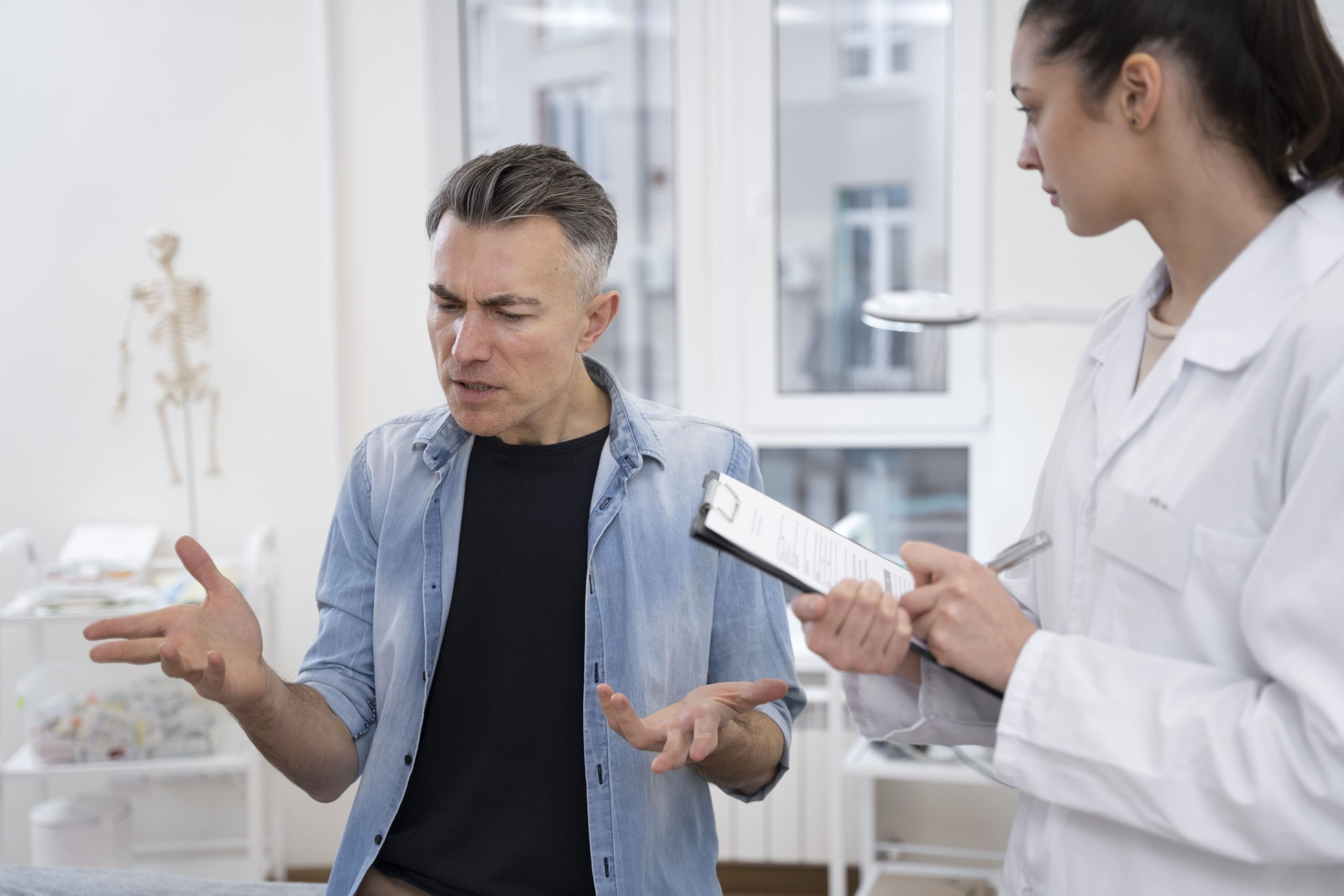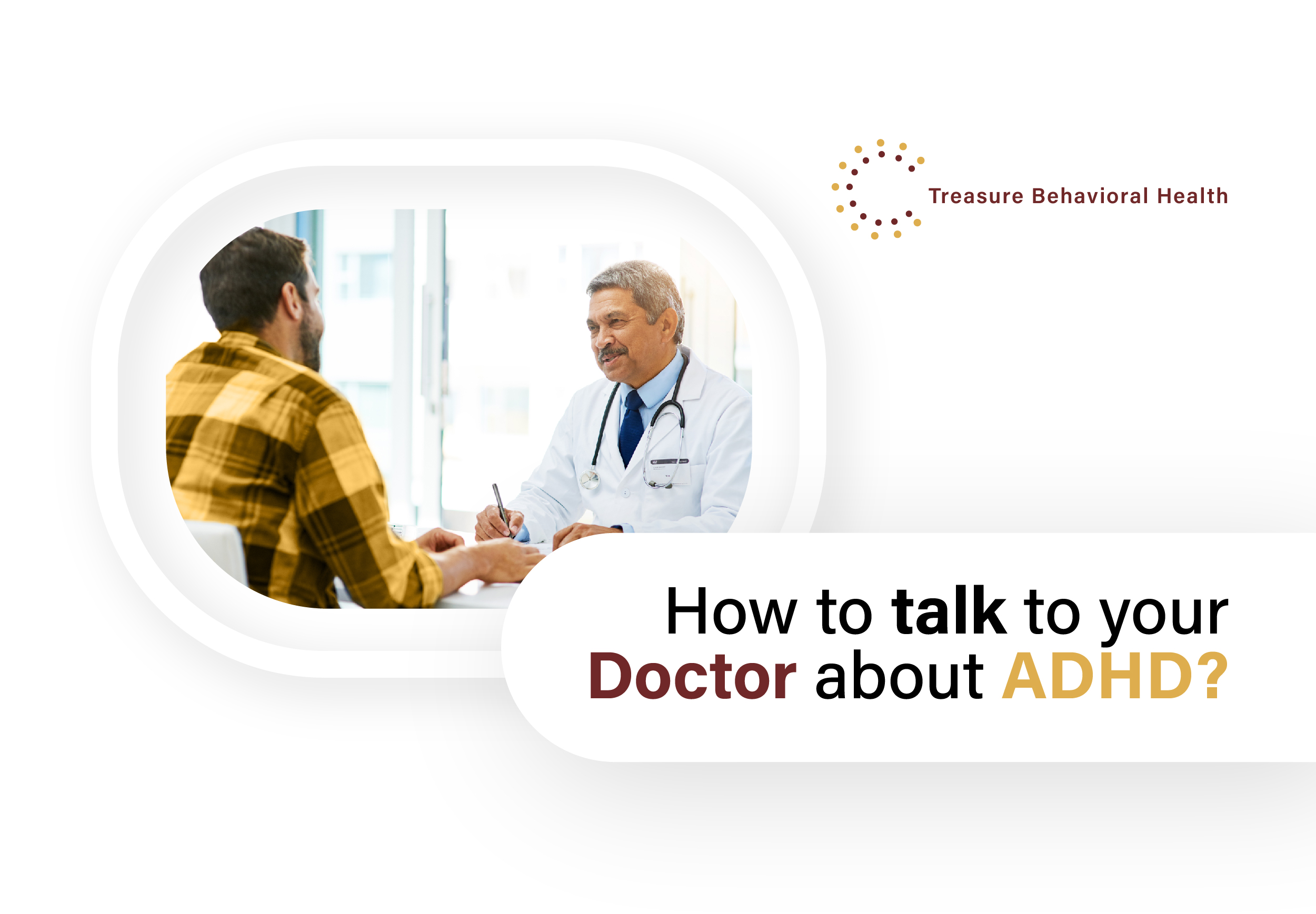Attention Deficit Hyperactivity Disorder (ADHD) affects millions of people in the US and all over the world. We all experience Forgetting things, trouble paying attention, or feeling restless.
It’s normal to have trouble focusing at work or in personal interactions. If symptoms persist and affect your daily life, seeing a doctor can help manage ADHD.
Good communication with your doctor is necessary for getting the right treatment. Treasure Behavioral Health can assist if you need access to a reliable healthcare provider.
You can connect with our Dr. Roberta Iyamu for improved ADHD treatment.
But the question “How to Talk to Your Doctor About ADHD?” Below, we will discuss it.
What is ADHD?
ADHD is a mental health condition. Those affected by ADHD commonly experience difficulties in concentrating, managing impulses, and remaining stationary.
It can make it hard for them to pay attention in school, follow instructions, or wait their turn.
Some people with ADHD are active and can’t sit still, while others might seem daydreamy and forgetful.
Treatment usually involves therapy and medication to help manage these challenges.
Identifying Signs of ADHD
To see if you have ADHD, you need to look for signs of having a hard time focusing and being too active or impulsive.
Signs of Trouble Paying Attention
- Making mistakes because you’re not careful.
- Finding it hard to focus or stay focused.
- Not listening when people talk to you directly.
- Struggling to follow instructions.
- Having trouble organizing tasks or activities.
- Avoiding tasks that require a lot of thinking.
- Forgetting important things.
- Getting easily distracted.
Signs of Being Overly Active or Impulsive
- Constantly moving around or tapping your hands.
- Getting up when you’re supposed to stay seated.
- Being hyperactive in situations where you should be calm.
- Finding it hard to relax and enjoy leisure activities.
- Always feel like you need to be doing something.
- Talking a lot, sometimes at inappropriate times.
- Having trouble waiting your turn?
- Blurting out answers before hearing the whole question.
- Interrupting others when they’re speaking.
Signs of Adult ADHD and Why Getting Checked is Important
In adults, ADHD may also show up as frustration, irritability, or mood swings.
It’s important to get checked and treated for ADHD because it can cause problems like using drugs or alcohol too much, having trouble sleeping or eating, and feeling sad or anxious.
If you’re worried, talking to a doctor or nurse can help.
Let’s find out “How to talk to Dr about ADHD?”
How to Talk to Your Doctor About ADHD

If you or someone you know shows signs of ADHD, don’t wait to get help. Talk to your doctor. They can help you figure out what’s going on and find the right treatment.
If you need help figuring out where to start, talk to your regular doctor first. They can refer you to a specialist if needed.
If you’re already seeing a therapist or psychiatrist, contact them too. Please don’t wait too long to talk about it, though.
Some people worry about taking too much medication. It’s important to focus on getting the right diagnosis and treatments.
Once you’re ready to talk to your doctor, it can help to have a plan. Here are some steps on how to talk to the doctor about ADHD.
Step 1: Recognize the Symptoms
Before you make an appointment, make sure you know the common signs of ADHD. These may include difficulty paying attention, impulsivity, hyperactivity, disorganization, and difficulty completing tasks.
Step 2: Schedule an Appointment
Contact your primary care physician to schedule an appointment to discuss your concerns about ADHD. It’s essential to see a healthcare professional who knows much about ADHD.
Step 3: Explain Your Symptoms
During your appointment, clearly explain the symptoms you’ve been experiencing.
Be specific about when these symptoms occur and how long they have been present.
Providing examples of situations where you struggled due to ADHD symptoms can be helpful.
Step 4: Be Honest When Questioned
Your doctor may ask you various questions about your symptoms and their impact on your life. Be honest and open when answering these questions, even if they feel personal.
Your doctor needs accurate information to make an informed diagnosis and treatment plan.
Step 5: Discuss Your Medical History
Your doctor may ask about your medical history, including past ADHD treatments. They may ask about any family history of ADHD or related disorders, as they can be hereditary.
Step 6: Follow-Up
After your first appointment, attend any follow-ups your doctor suggests. These visits allow you to monitor your progress, adjust your treatment plan, and address ADHD follow-up questions.
Below, I have mentioned some ADHD follow-up questions that may be useful for you.
ADHD Follow-Up Questions
When you go back to your doctor about ADHD treatment, you can ask follow-up questions just like:
- How can I better manage my symptoms in specific work or social settings?
- Are there any new treatment options or therapies that may benefit me?
- Are there any potential side effects with my current medication?
- Should I consider therapy or counseling in addition to medication?
- How can I explain my ADHD to friends, family, or colleagues?
- What strategies can I use to cope with frustration?
How to Talk to Your Doctor About ADHD Medication?
Before starting any medication, it’s crucial to understand how to use it properly. Here are some more questions on how to ask your doctor about ADHD-prescribed medication:
- Do I need to take it daily?
- Do I need to take it with food or without food?
- What should I do if I forget to take a dose?
- Should I take it at a specific time of day?
- Will I need regular check-ups or monitoring while on this medication?
- How long will I need to take the medication?
- Can I take other drugs or supplements alongside this one?
Let’s read about the benefits of therapy for ADHD to gain Knowledge.
Benefits of Therapy for ADHD
Here are some benefits of therapy for ADHD:
- Therapy helps you learn better ways to deal with ADHD challenges.
- You’ll understand your ADHD better and learn how to manage it.
- It teaches you how to stay organized and manage your time effectively.
- You’ll learn how to communicate better with others and handle relationships.
- Therapy can help you control impulsiveness and hyperactivity.
- You’ll learn techniques to handle your emotions and stress.
- It supports you in dealing with other problems like anxiety or depression.
- You’ll get tips to improve your school or work performance.
- Therapy can help you with friendships and social situations.
- Overall, it makes your life better and happier.
Primary Care Physician ADHD Near Me
Finding primary care physicians who specialize in ADHD near your location can be done through several methods:
- Look for doctors who specialize in ADHD nearby using websites like Treasure Behavioral Health.
- Check with your insurance company’s website, which may have a list of doctors covered by your plan.
- Call hospitals or clinics that may have doctors who specialize in ADHD.
- You can also find doctors online who can help through video calls.
- Ask mental health centers or ADHD support groups for advice on finding doctors who know a lot about ADHD.
Conclusion
To sum up, “How to Talk to Your Doctor About ADHD?” it’s important to talk openly with your doctor about ADHD concerns.
Make sure to schedule an appointment with a doctor who understands ADHD well. During your visit, be honest about your experiences and questions to ask someone with ADHD.
Follow-up appointments help monitor progress and adjust treatment as needed.
At Treasure Behavioral Health, we make sure everyone feels welcomed and supported. Dr. Roberta Iyamu and the team are here to help you with your ADHD symptoms.
We’ll work together to develop an effective and safe plan to treat ADHD. For more information Contact us at Treasure Behavioral Health.
FAQs
Can general practitioners prescribe Adderall?
Yes, in many cases, general practitioners can prescribe Adderall for the treatment of ADHD, although some may refer patients to specialists for diagnosis and ongoing management.
How do I talk to my doctor about ADHD?
Express your concerns about difficulties focusing, impulsivity, and restlessness, and ask your doctor about the possibility of ADHD evaluation and treatment options.
Can nurse practitioners diagnose ADHD?
In many regions, nurse practitioners can diagnose ADHD and initiate treatment plans, but they might refer to specialists for complex cases or medication management.
How to talk to your doctor about ADHD in adults?
To discuss ADHD in adults with your doctor, openly share your symptoms and concerns and inquire about suitable treatment options.
What should I do if I feel uncomfortable discussing ADHD with my doctor?
If you feel uneasy, you can bring a trusted friend or family member to support you during the appointment.
How does a doctor’s ADHD diagnosis letter help someone get the extra help they need at school or work?
A diagnosis letter provides official proof for requesting accommodations in school or work.



No comment